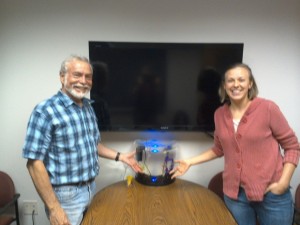| First Day Meeting June 16,2014
Dr. Fred Gould and Dr. Megan Fitz with their transgenic pets |
My first week at Dr. Gould’s lab: I have really enjoyed getting to know the people that work with him. Dr. Megan Fitz has been great and provided opportunities for me to get involved in DNA extraction of Heliothis veresens (moth) which is a pest to cotton plants, tobacco and other crops. The DNA extraction technique that they use is a two day process. After the DNA is separated from the moth tissues, it is run through a PCR machine that allows the small amounts of DNA to be amplified. The DNA is then run on an electrophoresis gel to further separate the DNA into bands. Below, you can see Alex setting up the gel to run electrophoresis.
 |
|
| Alex is an undergraduate at NC State. Her experience in Dr. Gould’s lab has prompted her to change her major and pursue further studies in genetics. |
During my first week, I gained a better understanding of the research done in Dr. Gould’s lab. Their work on insect pests such as moths has given us a better understanding of how insects evolve overtime as result of the use of Bacillus thuringiensis (Bt) crops. The incredible part of this research project is that it was only possible because of the foresight of Dr. Gould. Before the implementation of Bt crops in 1997, Dr Gould started collecting the targeted pests such as the Heliothis veresens moth. His collections have enabled research on how selective pressure causes changes in the genetic structures of insects.
I found most of the lab work and data collection relies on precision and attention to detail. But what makes the work interesting is the passion that these individuals have for their research. Dr. Megan Fitz is currently tracking the chikungunya disease as it moves into the US carried by its mosquito vector. She is trying to initiate collection of mosquitoes prior to the disease entering an area. She hopes find ways to combat the transmission of the disease by comparing the DNA of the infected mosquitoes with the uninfected mosquitoes. While Dr. Marce Lorenzen is fascinated by the tick that is causing heartwater disease and trying to think of ways to stop the disease from infecting cattle in the US. Both researchers are driven by their passion to control disease and it is their future focus, imagination, and research skills that help us better understand the insects and the diseases they carry.
I think one thing that is evident from working in the lab this week is that these scientists are all very passionate about their research and the impact it has on our health, crops, and pest management.
Watch Dr. Megan Fitz’s Mosquitoes Population
I love this video of Dr. Marce Lorenzen. I am especially interested by how difficult school was for her in middle school. Many students that I had this year could relate this and would be cheered by her example.
